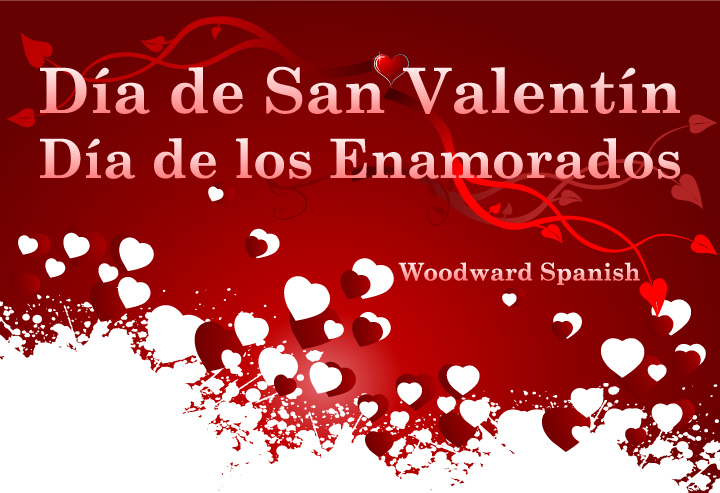
Valentine's Day
Learn Spanish Vocabulary
How to say Valentine's Day in Spanish
There are three main ways of saying Valentine's Day in Spanish. The most common way, which is a direct translation, is el Día de San Valentín. Another way is el Día de los Enamorados (which means something like "Day of those who have fallen in love"), and in some countries el Día del amor y la amistad (Day of Love and Friendship) is used.
NOTE: In Colombia, instead of celebrating Valentine's Day in February, the Día del amor y la amistad is celebrated on the third Saturday of September. Some people celebrate it all weekend.
Spanish to English Valentine's Day Vocabulary
abrazo (noun - masc): hug
- Mi novia me dio un abrazo muy grande.
admirador (noun - masc): admirer
- Él es tu admirador secreto.
amiga (noun - fem): (female) friend
- Paula es la mejor amiga de Angélica.
amigo (noun - masc): (male) friend
- Diego tiene muchos amigos.
amistad (noun - fem): friendship
- Amistades que son ciertas, mantienen las puertas abiertas.
amor (noun - masc): love
- Ella es el amor de mi vida.
anillo (noun - masc): ring
- Mi novio me dio un hermoso anillo de compromiso.
beso (noun - masc): kiss
- Después de ver la película él me dio un beso.
catorce (adjective): fourteen
- El catorce de febrero celebramos el Día de los Enamorados.
cena (noun - fem): dinner
- Esta noche con mi marido tendremos una cena romántica.
chocolate (noun - masc): chocolate
- José le llevó chocolates con forma de corazón a Josefa.
cita (noun - fem): date
- Preparé un cita muy entretenida para celebrar con mi esposa.
cinta (noun - fem): ribbon
- Recibí unas flores con una hermosa cinta roja de terciopelo.
comprometido (adjective): engaged
- Cristián está comprometido con Yasna.
corazón (noun - masc): heart
- Cada vez que veo a Roberto mi corazón late fuerte.
cupido (noun - masc): cupid
- Creo que cupido flechó a Lorena.
dulce (adjective): sweet
- Amparo es una joven muy dulce y linda.
dulces (noun - masc): sweets
- Mi amigo me regaló unos dulces deliciosos.
enamorarse (verb): to fall in love
- Esa pareja se enamoró el día de mi fiesta.
febrero (noun - masc): February
- En febrero celebraremos el día de los enamorados con una cena.
feliz (adjective): happy
- Estoy muy feliz con mi esposo.
flecha (noun - fem): arrow
- Creo que a Daniel le llegó la fecha de cupido.
flor (noun - fem): flower
- Mi pretendiente me regaló una flor.
globo (noun - masc): balloon
- La tienda vende globos con diseños especiales para el día de los enamorados.
poema (noun - masc): poem
- Carlos escribió un hermoso poema para su amada.
ramo (noun - masc): bunch (of flowers)
- Nunca he recibido un ramo de flores el día de los enamorados.
regalo (noun - masc): gift; present
- A Gabriela le compraron un regalo enorme.
restaurante (noun - masc): restaurant
- Ese restaurante tiene una cena especial para las parejas.
romance (noun - masc): romance
- El romance es para quien quiera creer en él.
romántico (adjective): romantic
- Tengo mucha suerte, mi marido es muy romántico.
rosa (noun - fem): rose
- Mi secretaria recibió una rosa por el día de los enamorados.
secreto (noun - masc): secret
- El secreto para una linda velada es disfrutar la compañía.
sentimientos (noun - masc - plural): feelings
- Aunque es difícil hablar de mis sentimientos, con ella es fácil.
tarjeta (noun - fem): card
- El joven escribió una tarjeta muy romántica a su novia.
Other Valentine's Day Expressions in Spanish
amor a primera vista: love at first sight
te amo: I love you
te quiero: I love you; I like you a lot
Difference between Te Amo and Te Quiero
Te amo is I love you (with all the strength this indicates). It is usually used between husband and wife or serious relationships that have lasted a long time. Also Te Amo is normally used between Parents and their children (which is a different type of love all together). If someone says Te Amo after a relationship of only a few days or weeks then you know something is not right.
Te quiero is sometimes used as a "soft" I love you and is quite acceptable between boyfriends and girlfriends. You may even find long-time friends using this with each other.
Did you know...?
The most common words for boyfriend and girlfriend in the Spanish-speaking world are Novio and Novia.
HOWEVER, In Chile the word for boyfriend is pololo and girlfriend is polola. Novio/Novia are only used in Chile when they are officially engaged.
Next Activities
Try our interactive game translating Valentine's Day Vocabulary from English to Spanish.
Ver nuestros apuntes del Día de San Valentín en español and our Valentine's Day Spanish Vocabulary Game.
If you found this Spanish Vocabulary about Valentine's Day interesting or useful, let others know about it.

